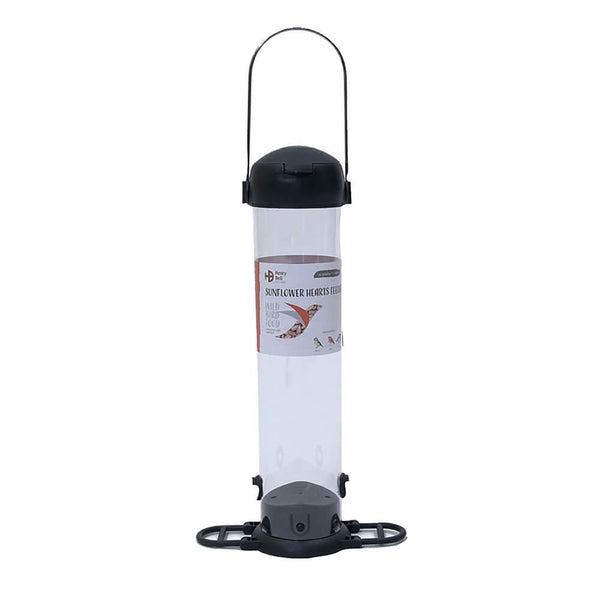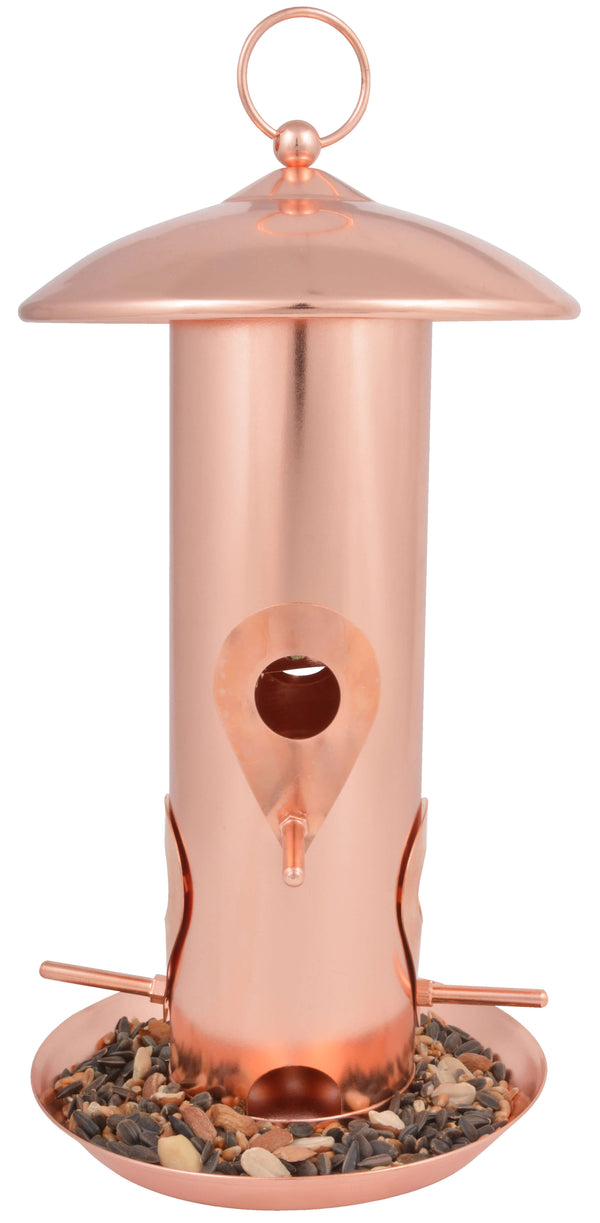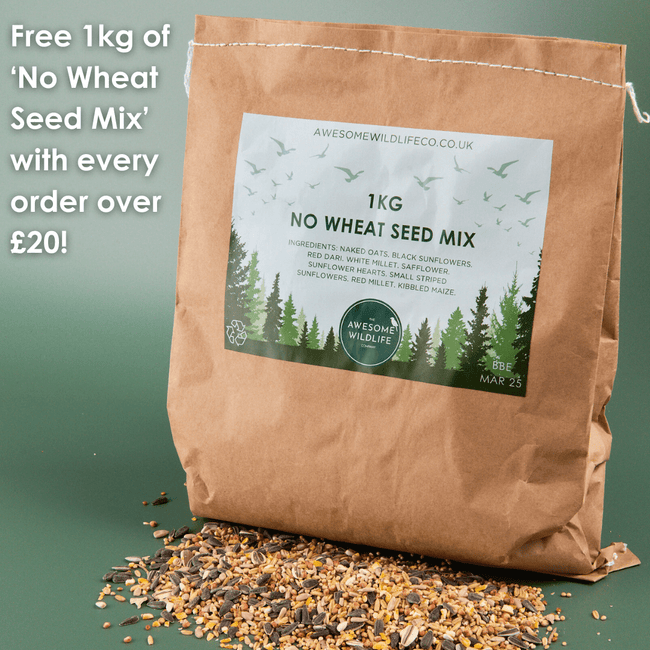Can Birds Eat Sunflower Seeds?
Birds are a delightful and fascinating part of the natural world, enriching our lives with their colours, melodies, and graceful flight and can be found in every country. Observing these winged wonders can be a joyous experience and even a hobby for some. Especially when we offer them a helping hand by providing bird food in our gardens or local parks.
One popular treat that many bird enthusiasts like to offer is sunflower seeds. But can birds really eat sunflower seeds, and is it a safe and nutritious option for them? In this blog post, we'll explore the relationship between birds and sunflower seeds, discussing the benefits, potential risks, and tips for responsible feeding.
The Appeal of Sunflower Seeds:
Sunflower seeds have long been a favoured snack for humans, and it's no surprise that birds are equally drawn to them. These seeds are rich in essential nutrients, including healthy fats, proteins, fiber, vitamins, and minerals. They are readily available and relatively affordable, making them a convenient choice for bird feeding enthusiasts.

Types of Sunflower Seeds
When it comes to feeding garden birds, not all sunflower seeds are created equal. There are different types of sunflower seeds available, each catering to the specific needs and preferences of various bird species. Understanding these seed variations will help you make informed choices and attract a diverse array of feathered visitors to your backyard. Here are the main types of sunflower seeds commonly used for bird feeding:
-
Black Oil Sunflower Seeds:
Black oil sunflower seeds are the most popular and widely recommended choice for bird feeders. They have a thin shell, making them easier for smaller birds to crack open and access the nutrient-rich kernel inside.

-
The high oil content in these seeds provides an excellent source of energy, making them ideal for sustaining birds during harsh weather conditions and long migrations. Their versatility makes them attractive to a wide range of bird species, from small finches to larger birds like cardinals and jays.
-
Striped Sunflower Seeds:
Striped sunflower seeds have thicker shells compared to black oil sunflower seeds, which makes them a bit more challenging for some birds to crack open. As a result, they are often favoured by larger birds like woodpeckers, blue jays, and grosbeaks.

-
While not as efficient for small birds, they still provide a good source of nutrition and can be used as part of a mixed seed blend to attract a diverse group of bird species.
-
Sunflower Hearts or Chips:
Sunflower hearts, also known as sunflower chips, are hulled sunflower seeds with the outer shell removed. This means that the birds don't need to crack them open, making them an excellent option for species with smaller beaks or those that prefer the convenience of ready-to-eat seeds. Sunflower hearts are highly desirable to a wide range of birds, including finches, sparrows, and doves.
-
Sunflower Suet Pellets:
Sunflower suet pellets are a popular choice during colder months or when wild birds need an extra energy boost. These pellets are made from a mixture of suet (animal fat) and sunflower seeds, providing birds with a high-calorie treat that helps them stay warm and active during winter. Woodpeckers, chickadees, and nuthatches are particularly fond of suet-based offerings.
What Birds Eat Sunflower Seeds?
Many bird species thoroughly enjoy munching on sunflower seeds. Common backyard visitors such as cardinals, blue jays, chickadees, finches, nuthatches, and sparrows are known to relish sunflower seeds. Their varied sizes and shapes make them easily accessible to different bird beak types, allowing a wide range of avian friends to partake in the feast.

How to Feed Sunflower Seeds in the Garden:
By providing these delightful creatures with a nutritious food source, you'll not only attract a diverse array of bird species but also contribute to their well-being. Here are some tips on how to effectively feed sunflower seed in your garden:
-
Choose the Right Bird Feeder:
Selecting the right bird feeder is crucial for feeding sunflower seeds effectively. There are various feeder types available, such as hopper feeders, tube feeders, and platform feeders. For sunflower seeds, a hopper feeder with perches or a tube feeder with large openings is ideal. These feeders allow easy access to the seeds and accommodate both small and larger bird species.
-
Position the Feeders Wisely:
Strategically placing the bird feeders in your garden is essential to attract birds while ensuring their safety. Place the feeders in areas with some cover nearby, such as trees or shrubs, so that birds can quickly retreat if they sense danger. Also, ensure that the feeders are away from potential hazards like windows to prevent bird collisions.
-
Offer a Variety of Seeds:
While sunflower seeds are a favourite among many birds, offering a variety of seeds can attract a more diverse range of species. Consider using a seed blend that includes black oil sunflower seeds, striped sunflower seeds, millet, and other seeds that cater to different bird preferences. This will help you create a welcoming feeding station for birds with varied dietary needs.

-
Using Bird Tables:
In addition to traditional bird feeders, bird tables can be a wonderful alternative for feeding sunflower seeds and attracting a diverse range of birds to your garden. Bird tables, also known as bird feeding stations or platforms, provide a larger, open space for birds to perch and feed. Here's how you can effectively use bird tables to feed sunflower seeds in your garden:
-
Selecting the Right Bird Table:
Choose a sturdy and well-built bird table that is designed to withstand various weather conditions and accommodate the size and weight of multiple bird visitors. Look for a table with a raised rim or edge to prevent the seeds from spilling over easily, and one with enough space for birds to comfortably perch while feeding.
Benefits of Feeding Birds Sunflower Seeds:
-
Nutritional Value: Sunflower seeds offer birds a nutrient-packed meal, essential for their overall health, especially during challenging times like winter when food is scarce.
-
Energy Boost: The high fat content in sunflower seeds provides a quick and efficient energy source for birds, helping them endure harsh weather conditions or long migratory journeys.
-
Attraction: Placing sunflower seeds in a bird feeder can attract various bird species, making your backyard a hub for avian activity and an enjoyable sight for birdwatchers.
-
Entertaining: Watching birds engage in playful interactions while feeding can be entertaining and educational for individuals of all ages.
Potential Risks and Precautions:
While sunflower seeds can be beneficial to birds, some precautions are necessary to ensure the birds' safety:
-
Moderation: Like all things, moderation is key. To feed sunflower seeds as part of a balanced diet is essential. Birds need a diverse range of foods to meet their nutritional requirements fully.
-
Unsalted and Unflavoured: Always provide unsalted and unflavoured sunflower seeds, as additives like salt and flavourings can be harmful to birds.
-
Avoid Moldy Seeds: Check the seeds for signs of mold before offering them to birds, as consuming moldy seeds can lead to health issues.
-
Keep Feeders Clean: Regularly clean bird feeders to prevent the growth of harmful bacteria, which can adversely affect the birds' health.
-
Pest Concerns: Be mindful that sunflower seed can attract other pests like squirrels and rodents. Using appropriate feeders or squirrel-proofing measures can help mitigate this issue.
In conclusion, garden birds can indeed eat sunflower seed and derive several benefits from consuming them. By providing these delightful creatures with a safe and nutritious food source, we can foster a thriving avian community right in our backyards.
However, responsible bird feeding entails using high-quality, unsalted, and unflavoured seeds, as well as maintaining clean feeding stations. With a little care and consideration, we can ensure that our feathered friends continue to grace us with their presence and bring joy to our lives for years to come. So, let's open our hearts and gardens to these marvellous creatures and delight in the wonders of nature unfolding before our eyes.










